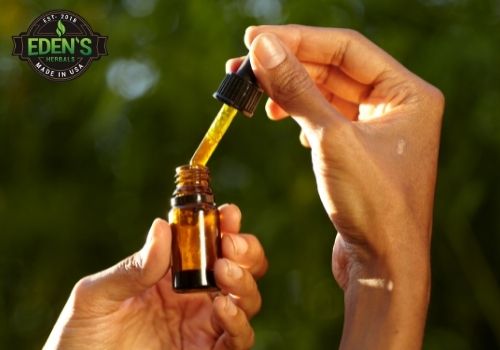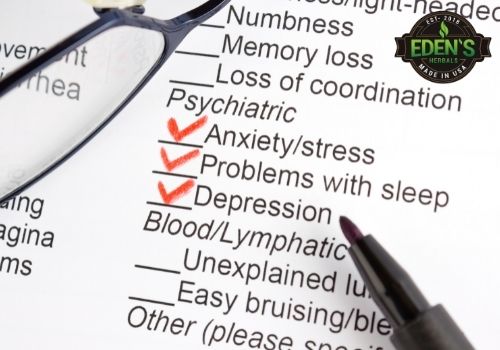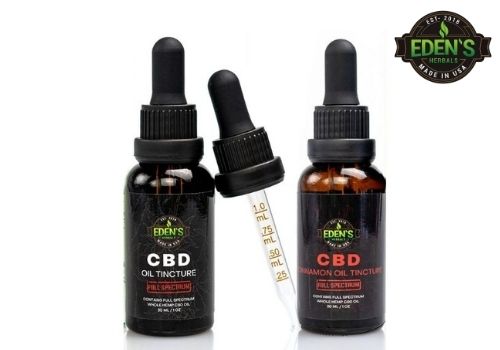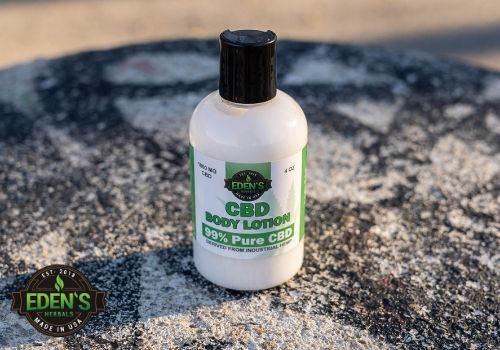 As we learn more about CBD's health benefits, most of you might wonder: "How much CBD should I take?" or "How do I know if this is working?".
As we learn more about CBD's health benefits, most of you might wonder: "How much CBD should I take?" or "How do I know if this is working?".
It's understandable to be skeptical about your health, especially on a product that is quickly gaining momentum as a powerful therapeutic compound.
In this article, we'll dive into scientific studies that confirm CBD's effectiveness in treating specific conditions. More importantly, we'll show you how to monitor your improvement on a daily CBD regimen, as well as the importance of tracking how much CBD to take safely.
Finding out about CBD's power can be answered by incorporating a few suggestions and learning the following:
- What is CBD?
- The Importance of Keeping a CBD Journal
- What Is the Best CBD Dosage for You?
- CBD Oil Side Effects
- How Long Does It Take For CBD To Take Effect?
What is CBD?
 Extracted from the hemp plant, cannabidiol (CBD) belongs to the plant family Cannabis sativa. Unlike its other primary ingredient, THC, CBD doesn't leave you feeling "high."
Extracted from the hemp plant, cannabidiol (CBD) belongs to the plant family Cannabis sativa. Unlike its other primary ingredient, THC, CBD doesn't leave you feeling "high."
The National Institute of Health concluded, "Preclinical and clinical studies suggest that cannabidiol (CBD) found in Cannabis has broad therapeutic value."
The FDA has approved CBD to treat epilepsy, cancer-associated nausea, and weight loss in HIV patients. Other therapeutic potential applications include:
- Addiction
- Arthritis
- Anxiety
- Diabetes
- Inflammation
- Insomnia
- Multiple Sclerosis
- Pain
- Post Traumatic Stress Disorder (PTSD)
The Importance of Tracking Your CBD
Listening to your gut is not just an old wives' tale. It's the science of listening to your body and getting valuable feedback. Keeping a journal is the best way to track your body's interaction with CBD. Not only will you receive peace of mind knowing that CBD is effective, but you'll also find out which dose is best for you.
For example, if you're also on a diet, you can open an excel spreadsheet or google docs and track your weight and CBD dose every day for a month. Listen to your "gut" and find out what's working and what's not. If you do not see the results you like, increase your dosage by small increments, one month at a time.
What Is the Best CBD Dosage for You?
It is essential to consider body weight beforehand. No one size fits all, either, as each person's endocannabinoid systems (ECS) differ. The ECS is the part of our neurochemical system that interacts with CBD to deliver its effects.
Start with the smallest possible amount, then switch to a larger quantity if no change occurs. It is important to find an effective dose of CBD to receive the most benefits.
If you're treating a specific condition, you can find a great resource at CBD dosage calculator. Split the doses into two a day with meals. Wait one week to let your body respond before moving on to a higher amount if needed.
 CBD can be safely taken in high doses, up to 1500 mg daily for one month. Make sure and look for brands that are lab-tested for purity.
CBD can be safely taken in high doses, up to 1500 mg daily for one month. Make sure and look for brands that are lab-tested for purity.
Choosing the Best CBD for Your Condition
It's also important to know which product to take for your condition. Whether you're an athlete, stay-at-home parent, or busy professional, finding the correct delivery method can be just as crucial as getting your dose right.
Full Spectrum CBD Oil: Full spectrum cannabinoids have the "full-spectrum" of the hemp plant benefits in their ingredients. These different hemp compounds interact with each other to deliver a more potent CBD. Known as the "entourage effect," users experience a more intense and well-rounded CBD effect.
CBD Lotions: For those with skin conditions, such as dry and cracked hands, CBD creams and lotions are a great option. By applying CBD directly to the irritated source, you can receive direct relief for issues ranging from painful joints to atopic dermatitis. Because topical use might have different effects for different users, it's suggested to use these in combination with an oral CBD.

CBD Oil Side Effects
In one promising NIH study, CBD showed a 'favorable safety profile". CBD also showed a better side effect profile than other drugs used to treat certain psychiatric conditions. Although more studies are needed, CBD side effects include the following:
- Tiredness: One common side effect is feeling more tired and relaxed while taking CBD. Although this can be a good thing, especially for anxiety sufferers, you may need to lower your dose if you're already on a sedative prescription.
- Diarrhea and Changes in Weight: Changes in appetite and gastrointestinal issues can occur while taking CBD. Monitor if you've gained or lost weight or suffer from diarrhea and adjust accordingly.
- Dry Mouth: Another common side effect is dry, 'cotton mouth.' Not only can it cause your mouth to dry, but also your eyes. Most people experience this much more frequently with CBD's sister compound, THC.
CBD is still not regulated by the FDA. That's why it's essential to shop from a reputable maker that uses lab testing. Investing in a lab-tested CBD ensures you're getting the highest quality product and minimizing any adverse side effects. If you're taking other medications, make sure and consult with your doctor before starting a CBD regimen.
How Long Does It Take For CBD To Take Effect?
Higher concentrations will work faster on your system, but each person varies. Most newbies will want to start with the smallest possible dose and gradually increase as you feel your body adapting to the effects. Delivery methods also play a factor.
While it's recommended to take with food, CBD taken on an empty stomach will also increase the feeling of the effects. For speed and effectiveness, sublingual drops are the way to go. Many people say they experience immediate relief with tinctures, with others experiencing relief within one hour.
 Topicals and lotions hit the targeted location better, but they typically take longer to absorb into the body than sublingual.
Topicals and lotions hit the targeted location better, but they typically take longer to absorb into the body than sublingual.
CBD gummies are a convenient way to get relief and usually take as little as 90 minutes to start working. The advantage of oral consumption is that the effects typically last longer.
A Few Final Words
Keeping a CBD journal is probably the best, most hands-on approach to determining how much CBD is right for you. You can also educate yourself by going to well-respected studies led by the NIH, Harvard, and other objective resources online.
Make sure to also purchase from companies that offer 3rd party, lab-tested CBD products.
Everyone will experience slightly different results based on body weight and other factors, but following a few suggestions here will go a long way to finding the perfect CBD solution for you.
If you want to learn more about tracking your CBD usage contact Eden's Herbals at support@edensherbals.com today!
*These statements have not been evaluated or approved by the Food and Drug Administration and are not intended to diagnose, treat or cure any illness. Medical advice should be taken from a medical professional.
All of the articles on this site are written by 3rd party content providers, expert bloggers or doctors not directly affiliated with Eden's Herbals.
Individuals should learn the risks and side effects prior to taking CBD. Make sure to always check with a medical professional before starting any new CBD treatment or medication that is not FDA approved.


